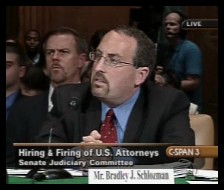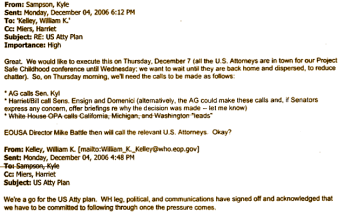Newly released files from the lynching of two black couples more than 60 years ago contain a disturbing revelation: The FBI investigated suspicions that a three-term governor of Georgia sanctioned the murders to sway rural white voters during a tough election campaign.
The 3,725 pages obtained by The Associated Press under the Freedom of Information Act do not make conclusions about the still-unsolved killings at Moore’s Ford Bridge. But they raise the possibility that Eugene Talmadge’s politics may have been a factor when a white mob dragged the four from a car, tied them to a tree and opened fire.
"I’m not surprised … historians over the years have concluded the violently racist tone of his 1946 campaign may have been indirectly responsible for the violence that came at Moore’s Ford," said Robert Pratt, a University of Georgia history professor who has studied the case. "It’s fair to say he’s one of the most virulently racist governors the state has ever had."
Talmadge, who died just months after his 1946 election to a fourth term, dominated Georgia politics in the 1930s and 1940s with a mix of racism and pocketbook populism.
 He came under FBI scrutiny because of a visit he made to the north Georgia town of Monroe two days before the Democratic gubernatorial primary and a day after a highly charged racial incident there, a fight in which a black sharecropper stabbed and severely wounded a white farmer. The sharecropper was one of the four people who would later be lynched.
He came under FBI scrutiny because of a visit he made to the north Georgia town of Monroe two days before the Democratic gubernatorial primary and a day after a highly charged racial incident there, a fight in which a black sharecropper stabbed and severely wounded a white farmer. The sharecropper was one of the four people who would later be lynched.
In a report sent to FBI Director J. Edgar Hoover, the agent in charge of the investigation said Talmadge met with George Hester, the brother of the stabbed farmer. Citing an unconfirmed witness statement, the agent said Talmadge offered immunity to anyone "taking care of negro."
While the agent dismissed the notion of Talmadge’s involvement as "unbelievable," he said it still merited investigation. Other memos raised suspicions that state employees could even have been active participants in the lynching.
FBI agents took note of the political stakes. Talmadge faced a tough challenge in the Democratic primary — which was then tantamount to the general election — and Walton County was still up for grabs.
Talmadge eventually won the county by roughly 200 votes, with overwhelming support from the Blasingame District where the Hester family lived.
In the FBI memo to Hoover, the agent cited the opinion of Monroe assistant police chief Ed Williamson, who had spotted Talmadge meeting in front of the Walton County Courthouse with the brother of the stabbed farmer.
 "The opinion on Mr. Williamson’s part was that this conversation between Talmadge and Hester probably resulted in the Blasingame District going very definitely in the Talmadge column," read the memo.
"The opinion on Mr. Williamson’s part was that this conversation between Talmadge and Hester probably resulted in the Blasingame District going very definitely in the Talmadge column," read the memo.
Votes from small rural counties played a crucial role in Georgia’s elections then because primaries were decided by a "county unit system," similar to the electoral college, which minimized the impact of urban centers.
In fact, Talmadge’s challenger, James V. Carmichael, actually received the most popular votes but lost the election because of Talmadge’s strong support in rural areas.
My reaction to stories like this one is always the same – visceral, shame, wanting to divert my attention. It’s involuntary, and I have to actively refocus myself to read them. I grew up in that South, the one that generates these stories. I remember Segregation as just part of living here. I remember the racism and racist comments. I remember the pained look on my mother’s face when she admonished me to never participate, but I didn’t really understand the pain. I guess I didn’t know how far Talapoosa Georgia [where she grew up] was from Chattanooga where we lived – not in miles, but in something dark like this newspaper article describes. Back then, I didn’t understand her story of what happened when her father angrily ended his brief flirtation with the Klan, and she saw a cross burned in her own front yard while they sat inside in the dark with loaded guns.
I expect this news story is true. It’s certainly consistent with how things were back then, the characters involved. About the only comfort I can take when I read a story like this one is that, at least, it’s not like that anymore. It’s not right, and the holocaust of the last six years hasn’t helped anything. The anti-black racism isn’t politically correct anymore, so it hides in home schooling, and gated communities, and "white flight," and "voter fraud" campaigns. And it’s been extended to anti-Gay, anti-Hispanic, anti-Liberal open prejudices.
I know that the war on prejudice is just a constant part of the American experiment, but it is such a dark and painful part of our history, and our present, and it remains as painful for me to see as it was for my mother all those years ago. I’m just thankful that I grew up in a house where I was shown how to see it from the very start…



 He came under FBI scrutiny because of a visit he made to the north Georgia town of Monroe two days before the Democratic gubernatorial primary and a day after a highly charged racial incident there, a fight in which a black sharecropper stabbed and severely wounded a white farmer. The sharecropper was one of the four people who would later be lynched.
He came under FBI scrutiny because of a visit he made to the north Georgia town of Monroe two days before the Democratic gubernatorial primary and a day after a highly charged racial incident there, a fight in which a black sharecropper stabbed and severely wounded a white farmer. The sharecropper was one of the four people who would later be lynched. "The opinion on Mr. Williamson’s part was that this conversation between Talmadge and Hester probably resulted in the Blasingame District going very definitely in the Talmadge column," read the memo.
"The opinion on Mr. Williamson’s part was that this conversation between Talmadge and Hester probably resulted in the Blasingame District going very definitely in the Talmadge column," read the memo.

 During a hearing before the Senate Judiciary Committee last week, Bradley Schlozman, the controversial former senior political appointee in the Civil Rights Division, was battered with questions about his efforts to politicize the division.
During a hearing before the Senate Judiciary Committee last week, Bradley Schlozman, the controversial former senior political appointee in the Civil Rights Division, was battered with questions about his efforts to politicize the division. A two pronged attack alleging voter fraud coming from the U.S. Attorney’s Office and the Republican State Auditor is plenty suspect in 2007. It is remarkable that this kind of thing is continuing in the face of the scandal at the Department of Justice resulting in mass resignations over this very issue [Karl Rove is an Energizer Bunny]. The U.S. Attorney in Eastern North Carolina is George E. B. Holding. He was appointed in June 2006 when then U.S. Attorney Frank Whitney was elevated to a Federal Judgeship.Holding was Senate Confirmed. It is notable, however, that Holding was appointed in the year, 2006, when there was a push to get "Bushies" in place in the U.S. Attorney offices.
A two pronged attack alleging voter fraud coming from the U.S. Attorney’s Office and the Republican State Auditor is plenty suspect in 2007. It is remarkable that this kind of thing is continuing in the face of the scandal at the Department of Justice resulting in mass resignations over this very issue [Karl Rove is an Energizer Bunny]. The U.S. Attorney in Eastern North Carolina is George E. B. Holding. He was appointed in June 2006 when then U.S. Attorney Frank Whitney was elevated to a Federal Judgeship.Holding was Senate Confirmed. It is notable, however, that Holding was appointed in the year, 2006, when there was a push to get "Bushies" in place in the U.S. Attorney offices.